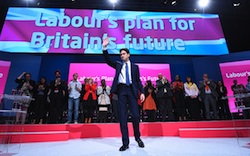HARRY BARNES has analysed Labour’s electoral programme and believes it starts to ‘open the door’ towards democratic socialism. He’s also provided a readable 16-part summary for those of us who haven’t yet ploughed through the 200-page document. Here, he outlines what it says about Ed Miliband’s Labour Party.
Under Ed Miliband’s leadership we seem to have come to a programme which seeks (a) to regulate the role of capitalism and (b) produce a more equitable society. This is not a fully fledged democratic socialist programme, nor does it claim that that is our direction of travel: yet it does start to open the door to such a development.
 Perhaps this is what Ed Miliband is about. He was very close to his father. This does not make him a closet Marxist, but nor does it mean that he has rejected his inheritance completely. He knows the intellectual parameters of politics well, with his PPE from Oxford, an MA from the LSE, and as a lecturer at Harvard.
Perhaps this is what Ed Miliband is about. He was very close to his father. This does not make him a closet Marxist, but nor does it mean that he has rejected his inheritance completely. He knows the intellectual parameters of politics well, with his PPE from Oxford, an MA from the LSE, and as a lecturer at Harvard.
But his work in the Parliamentary Labour Party – as a researcher, an MP and then leader – has been within what he himself might regard as a rather alien environment. Around him are people whose views were shaped by New Labour, either from the camps of Blair or Brown. He has to work with and through these. But he may have landed those around him in a position where they are stuck with an electoral programme which reveals something of Miliband’s influence, without him being in a position to write the full script or get people to work for that.
For now, he has to act with the likes of Ed Balls and the political class of the Labour Party, to advance his beliefs. Paradoxically, he is part of the same class, but he comes from a different background and could well have intentions that go beyond advancing his own career.
General thrust
The general election is only six months away and if Labour is to make an impact, it needs to start pressing this electoral programme now. After considerable inner-party discussions it came up with a final version of its agreed proposals at the recent annual conference. The document containing these policies is entitled ‘National Policy Forum Report 2014’ and it can be found here.
It is, however, 218 pages long and needs sorting into more manageable chunks, and an even easier-to-handle electoral manifesto. I have tried to do this in a series of items on my blog. Each of these will cover a single broad aspect of Labour’s programme, with page references for each of the sub-points I refer to. My intention is only to give the general thrust of Labour’s proposals, so sometimes extra items could have been added.
I have taken 180 points from the policy document, and for presentational reasons these are not direct quotes, but are near-quotes. My intention has been to retain the original meanings. I have also been selective as nearly twice as many points can be found in the original document. Hopefully, I have not missed out on any of the major areas.
I started to summarise these points because I felt the Labour Party was missing key opportunities to spread its ideas in the run-up to the election. Earlier versions of these proposals were missing from both the European election campaign and the Scottish referendum campaign, and when Labour finally adopted its proposals at conference, this was done in a very low-key fashion.
Originally, I had two main fears: first, that the party was only going to start pushing the programme in the short period of the election campaign after the Commons is dissolved, which would be too late; or, even worse, that the broad sweep of the proposals would be ignored and had only been worked on to keep the active rank and file quiet.
But things have now started to improve. Miliband’s speech at the CBI drew from the section on the private sector, and he came out with strong arguments against zero hours contracts.
Last week, the section on immigration was pushed stoutly by Yvette Cooper. And on Friday the section on the NHS was pursued strongly in the Commons debate on the Private Member’s Bill. There are also signs that Labour will aim to galvanise its members through a series of regional meetings (as shown here).
The party needs to push its programme, using the media, and then counter any flack that results. But it also needs its canvassers and candidates to be pressing the programme, for it moves us beyond New Labour and opens the door for clearer democratic socialist advance at a later stage.
—-
Harry Barnes’s blog, ‘Three Score Years and Ten’, and his dissection of Labour electoral programme, can be found here.
Labour’s full 280-page National Policy Form Report can be found here.



19 March 2015
[…] years and ten’ – Harry has been dissecting the various policy pronouncements to emerge from Labour’s review process over the last six months or so. In particular he has unpicked the 114 bullet points which make up Labour’s ‘Changing Britain […]
9 March 2015
[…] Barnes is author of the blog, Three Score Years and Ten. Recently, he has been scrutinising Labour’s emerging policy platform. […]
25 February 2015
Labour misses golden opportunities to inform its membership about its policies. See – http://threescoreyearsandten.blogspot.co.uk/2015/02/yet-another-missed-opportunity.html
19 January 2015
[…] Barnes is author of the blog, Three Score Years and Ten. Recently, he has focused on scrutinising Labour’s emerging policy platform. […]
5 January 2015
For a reasonably readable version of today’s speech by Ed Miliband as he lauched Labour’s General Election Campaign, see – http://threescoreyearsandten.blogspot.co.uk/2015/01/ed-opens-labours-election-campaign.html
His speech seemed to me to fit in with the optimistic line I took in my article.
9 December 2014
Labour has now come up with a key document which fits in with my own 16 part summary of Labour’s Policy Programme and which seeks responses via its ‘Your Britain’ website. Their document can be found here
Due to the time factor, I feel that Labour should not delay matters with further debate, but should lead on what it has and mobilise around it. But at least it is showing and pushing aspects of its current stance. Also it does provide an opening for clarifications and improvements in its positions.
This provides an important role for the ILP. It could do with an urgent get-together to sort out its submissions, hopefully by the New Year. If a get-together is difficult in that time then emails, telephone calls and this website can act as substitutes.
7 December 2014
There is also this, which I have just discovered on a Labour Party web-site –
http://action.labour.org.uk/index.php/cost-of-living-contract/
6 December 2014
In standing for the Labour Leadership in Scotland, Sarah Boyack has come up with a 100 policy proposals. I have not yet checked these out, but I hope that many of them fit in with the Labour Party Policy Documents which were adopted at Labour”s Conference. These cover the 180 bullet points which can be found via my above article. It is good if Sarah is publicising Labour Party Policy – we just need others to start doing this. Here are Sarah’s points –
http://www.sarahboyack4leader.com/100-ideas-for-a-new-scotland/